Laptop Stand, Power & Charger, USB Docking Station, USB Hubs
The Pros of moving manufacturing from China to Vietnam
In recent years, moving manufacturing from China to Vietnam has become a significant trend for global businesses. Vietnam offers several advantages, including competitive labor costs, a stable political environment, and preferential tax policies. These factors help companies optimize their supply chains and reduce reliance on China, minimizing potential risks. Additionally, moving manufacturing from China to Vietnam creates opportunities for cost savings, product quality improvements, and access to major markets such as the US and EU. In this article, Eili Industrial will help you explore the pros of moving manufacturing from China to Vietnam, while offering flexible solutions to help businesses effectively leverage the advantages of the Vietnamese market.
The trend of moving manufacturing supply chains from China to Vietnam
The trend of moving manufacturing from China to Vietnam has been gaining significant momentum as businesses look for ways to diversify their supply chains and reduce risks. This shift is driven by several key factors, including rising labor costs in China, geopolitical tensions, and the increasing desire for more resilient and flexible supply chains.
Vietnam offers a compelling alternative with its competitive labor market, favorable trade agreements, and proximity to major global markets. Moving manufacturing from China to Vietnam allows companies to maintain cost-effectiveness while ensuring product quality, benefiting from lower tariffs, and tapping into the growing potential of the Southeast Asian market. This trend is not only about cost savings but also about future-proofing supply chains in an increasingly uncertain global landscape.

Why Companies are Leaving China’s Manufacturing Ecosystem
The growing trend of moving manufacturing from China is driven by a number of factors that are reshaping global supply chains. In the following, we will explore the key factors driving this trend:
Rising labor costs
Rising labor costs in China have become a major catalyst for businesses moving manufacturing from China to Vietnam. Over recent years, China’s wage rates have risen significantly due to labor shortages and policies aimed at improving living standards, making it challenging for companies in cost-sensitive industries like electronics and consumer goods to maintain profitability. Vietnam, with its lower labor costs, skilled workforce, and flexible labor market, offers an attractive alternative. By shifting production to Vietnam, businesses can reduce expenses, increase profit margins and secure a competitive edge in the global market.
Trade Tariffs and Geopolitical Tensions
Trade tariffs and geopolitical tensions, particularly between the U.S. and China, have significantly reshaped global trade dynamics. According to Reuters, on May 14, 2024, U.S. President Joe Biden announced sharp tariff increases on various Chinese imports, including electric vehicles, computer chips, and medical products. Notably, tariffs on electric vehicles rose fourfold to over 100%, while taxes on photovoltaic cells used for solar panels doubled from 25% to 50%.
Additionally, tariffs on certain steel and aluminum products increased from 0% to 25%. These measures, set to impact $18 billion worth of Chinese goods starting September 27, have made exporting from China increasingly expensive, severely affecting the profitability of businesses dependent on Chinese manufacturing. As a result, companies are turning to alternatives like moving manufacturing from China to Vietnam to mitigate these challenges. By moving manufacturing out of China to Vietnam, companies can ensure long-term stability, protect profit margins, and maintain competitiveness in an evolving global market.
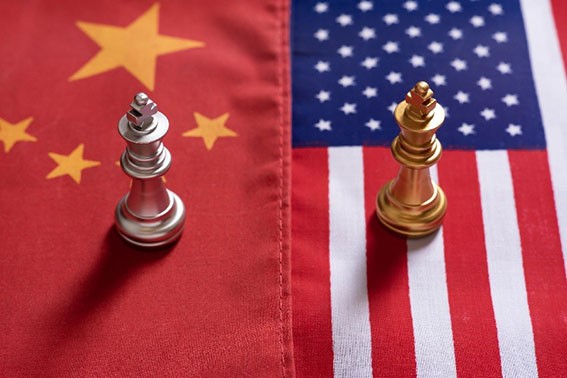
Environmental Regulations
China’s tightening environmental regulations have significantly increased costs for manufacturers, particularly in resource-intensive and high-emission industries. While these measures align with China’s commitment to sustainability and pollution control, they present substantial compliance challenges and expenses for businesses. To address these rising costs, many companies are considering moving manufacturing out of China to Vietnam, where environmental regulations are stringent but often more adaptable to manufacturers’ needs. Vietnam offers a cost-effective alternative, allowing businesses to maintain competitive pricing and greater production flexibility while managing their environmental impact. By moving manufacturing from China to Vietnam, companies can align their operations with both financial and sustainability goals, ensuring long-term competitiveness in a rapidly evolving market landscape.
Supply Chain Disruptions
The COVID-19 pandemic exposed the vulnerabilities of global supply chains, especially those overly dependent on a single country like China. This has driven many businesses to prioritize moving manufacturing from China to Vietnam as a strategic solution to mitigate future risks. By diversifying production to Vietnam, companies can reduce their reliance on a single source, ensuring supply chain continuity during global crises.

Intellectual Property (IP) Concerns
Intellectual property (IP) theft and counterfeiting have long been significant concerns for foreign companies operating in China. Weak enforcement of IP laws and the prevalence of counterfeiting have made businesses reevaluate their reliance on China for manufacturing. As a result, many companies are now prioritizing moving manufacturing out of China to Vietnam to address these challenges.
Vietnam offers stronger IP protections, supported by its adherence to international trade agreements such as the CPTPP and EVFTA, which emphasize strict enforcement of IP laws. By moving manufacturing from China to Vietnam, businesses can significantly reduce the risk of infringement, ensuring their proprietary technologies and designs remain secure. This shift not only safeguards innovations but also allows companies to maintain their competitive edge in a global market where intellectual property is a critical asset.
The Pros of moving Manufacturing from China to Vietnam
As global businesses seek alternatives to China for their manufacturing needs, Vietnam has rapidly emerged as a prime destination. The country offers numerous advantages that make it an attractive choice for businesses looking to optimize their production processes and reduce risk. Below, we break down the key factors that highlight the benefits of moving manufacturing from China to Vietnam.
Competitive Labor Costs
One of the key reasons businesses are moving manufacturing from China to Vietnam is the opportunity to optimize operational costs through Vietnam’s competitive labor market. With a workforce that is highly skilled and adaptable, Vietnam offers a robust talent pool for industries such as electronics and consumer goods. This competitive advantage enables businesses to streamline their operations while maintaining high standards of production quality.
Shifting production to Vietnam provides the flexibility to reallocate resources into other areas, such as technology upgrades or business expansion. This strategic approach not only helps businesses improve their profit margins but also strengthens their position in the global market. The overall efficiency gains and adaptability of the workforce in Vietnam make it an attractive destination for companies seeking to optimize their manufacturing processes and remain competitive in a rapidly changing global economy.
Convenient location
Vietnam’s geographical location is another major advantage for businesses considering moving manufacturing from China to Vietnam. Positioned at the crossroads of major trade routes in Southeast Asia, Vietnam offers easy access to global markets, including the U.S., EU, and Asia-Pacific regions. The proximity to key shipping lanes, such as the South China Sea, makes it easier and more cost-effective for businesses to manage logistics and supply chains. Additionally, Vietnam is located near other major manufacturing hubs like China and Thailand, which allows businesses to leverage the existing regional supply chains and networks. This convenient location helps reduce lead times and shipping costs, further enhancing the efficiency of operations.
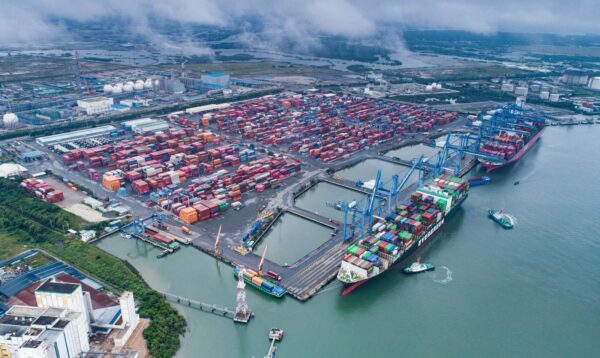
Political Stability
Political stability is a crucial factor for businesses when selecting a manufacturing location. Moving manufacturing from China to Vietnam offers the benefit of a stable political environment that supports business growth. The Vietnamese government has been actively working to improve its regulatory framework, ensuring that policies are favorable to foreign investment. This stability reduces the risks associated with political upheaval, which can disrupt operations and create uncertainty for businesses. In contrast to other countries in the region, Vietnam’s government is considered relatively predictable, providing businesses with the security they need to operate smoothly in the long term.
Trade Agreements
Vietnam has made significant strides in securing favorable trade agreements, which further enhance the benefits of moving manufacturing from China to Vietnam. As a member of multiple international trade organizations, including the Comprehensive and Progressive Agreement for Trans-Pacific Partnership (CPTPP) and the EU-Vietnam Free Trade Agreement (EVFTA), Vietnam offers preferential trade terms with some of the world’s largest economies. These trade agreements reduce tariffs and provide better access to key markets, making it easier and more cost-effective for businesses to export products globally. Additionally, Vietnam’s commitment to maintaining and expanding these trade relationships ensures that businesses manufacturing there will continue to benefit from a favorable trading environment.

Growing Infrastructure
Vietnam’s infrastructure is rapidly improving, further supporting the case for moving manufacturing from China to Vietnam. The country has made substantial investments in transportation networks, including modern highways, railways, and ports, which enhance the efficiency of goods movement across the country and internationally. New industrial zones and logistics hubs are being developed to cater to the needs of global businesses. These improvements in infrastructure help businesses reduce costs, enhance operational efficiency, and streamline their supply chains. In particular, Vietnam’s ports, such as the Tan Cang and Hai Phong ports, are becoming increasingly important for international trade, providing businesses with more reliable and efficient export and import solutions.
Dynamic Workforce
A key advantage of moving manufacturing out of China to Vietnam is access to a dynamic, young, and skilled workforce. Vietnam has a growing labor force, with a significant proportion of its population under 35 years old. This youthful demographic provides businesses with a pool of talent that is eager to work in various manufacturing sectors, including electronics, textiles, and automotive. Moreover, the Vietnamese government has placed a strong emphasis on education and vocational training, ensuring that workers are equipped with the necessary skills to meet the demands of modern manufacturing. As a result, businesses can rely on a skilled workforce capable of producing high-quality products efficiently.
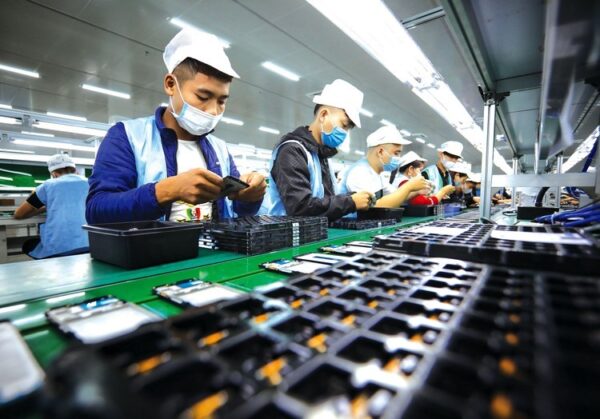
Eili Industrial – Your trusted partner in Vietnam
Eili Industrial is a leading manufacturer of high-quality products, making it an ideal partner for businesses moving manufacturing out of China to Vietnam. With a strong focus on innovation and reliability, Eili provides cost-effective solutions while maintaining strict quality control. The company’s product range includes lithium-ion batteries, AC adapters, chargers, and solar energy solutions.
By leveraging Vietnam’s stable political environment and competitive manufacturing capabilities, Eili helps businesses reduce production costs without compromising on quality. With comprehensive OEM & ODM services, Eili allows companies to customize products, build their brands, and gain a competitive edge. Eili’s efficient supply chain and reliable after-sales support make it the trusted choice for businesses seeking to optimize their operations and capitalize on the trend of moving manufacturing from China to Vietnam.
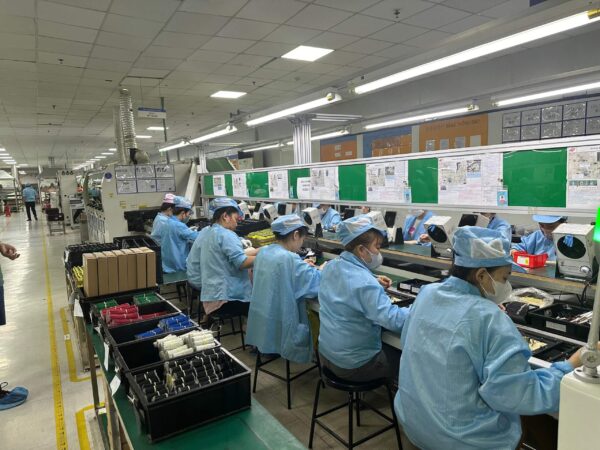
Quality Product at Eili Industrial
At Eili Industrial, we pride ourselves on delivering high-quality products that meet international standards. Some of the key products in our catalog include:
-
Laptop Stands
Eili Industrial’s ergonomic laptop stands ensure comfort, productivity, and a sleek design, perfect for both office and remote setups. Customizable options are available for businesses looking to align their product offerings with market needs.
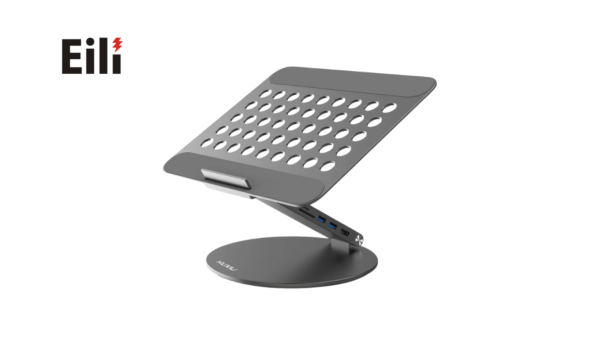
Laptop Stand at Eili Industrial
Models include:
- Multifunctional laptop stand with removable 6 in 1 USB Hub (LEGO DIY Design)
- Rotary Tablet/Phone stand holder
- Adjustable Laptop stand with removable HUB
- Portable laptop stand with 9 in 1 docking station (Chocolate Bar Design)
- Rotary Laptop stand with magnetic phone holder
- Rotary Laptop stand WITH removable HUB
- Rotary Laptop stand WITH removable HUB
- Rotary Tablet stand holder
-
USB Hubs
Eili’s USB Hubs are built to provide high-speed data transfer and connectivity, making them essential for users who need to connect multiple devices at once.

OEM USB Hubs at Eili Industrial
Models include:
- OEM 3-port USB 3.0 connection hub w/ethernet port
- OEM 4 PORTS USB HUB with adaptor
- OEM 4-in-1 USB A hub
- OEM 4-in-1 USB C Hubs
- OEM 6-in-1 USB Type C Hub
- OEM 8-in-1 USB C hub
- OEM Card reader
- OEM USB C 3.1 to Multi adaptor
- OEM USB TYPE C to HDMI
- OEM USB-C 3-Port HUB
- OEM USB-C 4-Port HUB
- OEM USB-C SD card reader
-
USB Docking Station
Eili’s docking stations allow seamless connection between laptops and external monitors, providing an all-in-one solution for workstations and improving overall productivity. Customization options are available to meet specific business needs.

-
Power Charger
Eili offers a range of power chargers, including fast chargers and multi-port solutions, to meet the demands of mobile devices, laptops, and other electronics. These chargers are designed to ensure efficiency and durability, making them reliable for business operations.
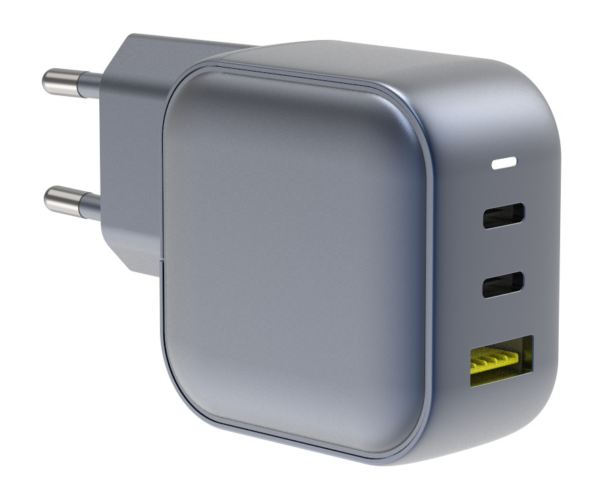
Eili Industrial adheres to strict international certifications, including ISO 9001, CE and RoHS, ensuring product safety, quality and environmental compliance.
Eili Industrial is proud to announce that our Quality Management System (QMS) conforms to the ISO 9001:2015 standard.
Conclusion
In conclusion, shifting manufacturing from China to Vietnam provides businesses with a strategic opportunity to optimize supply chains, reduce operational costs, and mitigate the risks associated with geopolitical tensions and evolving trade policies. Vietnam’s competitive labor market, favorable trade agreements, and stable political climate position it as a compelling alternative to China for companies looking to future-proof their manufacturing operations. For companies seeking to capitalize on these advantages, Eili Industrial offers reliable, cost-effective manufacturing solutions in Vietnam. Partnering with Eili Industrial empowers companies to enhance their competitive edge and achieve long-term success in the evolving global market.
Connect with EILI:


